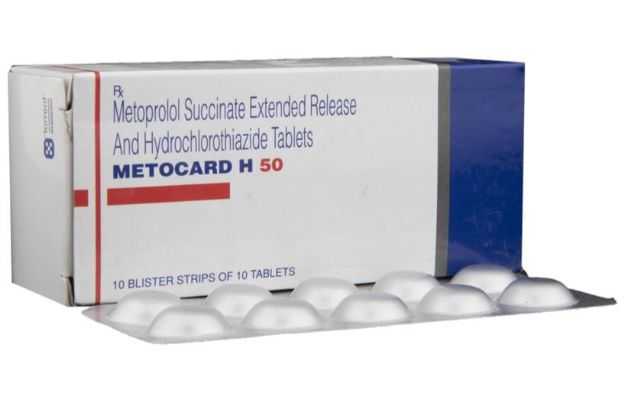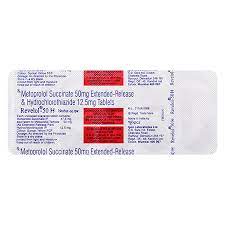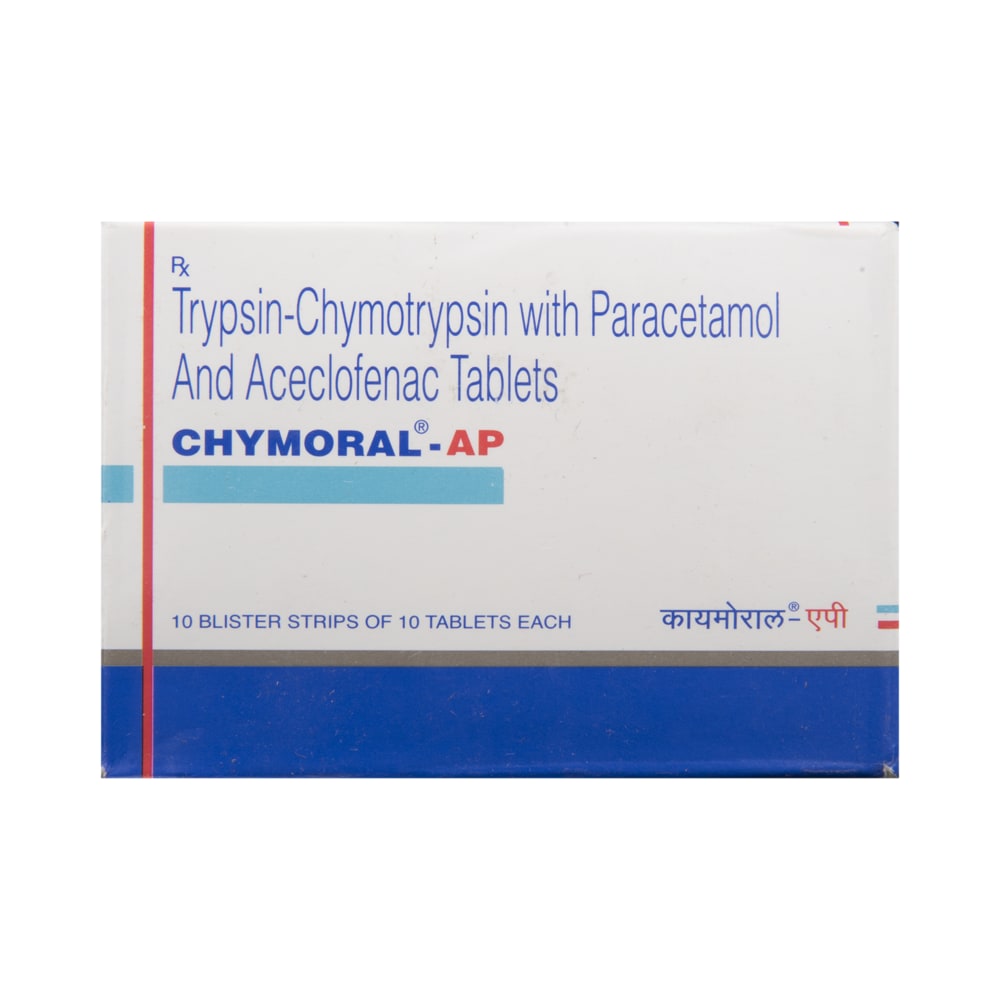Metocard H 50mg Tablet ER METOPROLOL SUCCINATE + HYDROCHLOROTHIAZIDE
This medication is a combination of two drugs betablocker Metoprolol Succinate and thiazide diuretics Hydrochlorothiazide Its primary purpose is to manage cardiovascular conditions especially hypertension high blood pressure Metoprolol Succinate a betablocker works by blocking certain natural substances which reduces the workload on the heart and leads to a decrease in heart rate and blood pressure Hydrochlorothiazide a thiazide diuretic helps the kidneys eliminate excess salt and water from the body reducing blood volume and aiding in blood pressure control Take this medication according to the dosage and duration recommended by your doctor


Are the medicines in combination of Hydrochlorothiazide and Metoprolol succinate safe to take together?
When Hydrochlorothiazide and Metoprolol succinate are used together, they can enhance each other's blood pressure-lowering effects, which may lead to hypotension. Monitoring blood pressure regularly is essential to ensure it remains within a safe range. Additionally, Hydrochlorothiazide can cause electrolyte imbalances, which may affect the action of Metoprolol. Regular blood tests to monitor electrolyte levels and kidney function can help detect and manage these interactions. Patients should report any symptoms of low blood pressure, such as dizziness or fainting, to their healthcare provider.

Are there harms and risks from taking combination of Hydrochlorothiazide and Metoprolol succinate?
Common side effects of Hydrochlorothiazide include frequent urination, diarrhea, and headache, while Metoprolol succinate may cause dizziness, tiredness, and depression. Both medications can lead to more serious adverse effects, such as electrolyte imbalances with Hydrochlorothiazide and shortness of breath or irregular heartbeat with Metoprolol. It's important to monitor for signs of dehydration, low blood pressure, or severe allergic reactions. Patients should report any unusual symptoms to their healthcare provider promptly to ensure safe and effective use of these medications.

Can I take combination of Hydrochlorothiazide and Metoprolol succinate if I am pregnant?
Hydrochlorothiazide and Metoprolol succinate have been used during pregnancy, but their safety is not fully established. Hydrochlorothiazide may cause electrolyte imbalances in the fetus, while Metoprolol can cross the placenta and may lead to fetal bradycardia or hypoglycemia. Pregnant women with hypertension should be closely monitored, and the potential risks and benefits of these medications should be discussed with a healthcare provider. Alternative treatments may be considered if the risks outweigh the benefits.

Can I take combination of Hydrochlorothiazide and Metoprolol succinate while breastfeeding?
Both Hydrochlorothiazide and Metoprolol succinate are present in breast milk, but there are no reports of adverse effects on breastfed infants. Hydrochlorothiazide in high doses may affect milk production due to its diuretic effect. Metoprolol is generally considered safe during breastfeeding, but infants should be monitored for signs of bradycardia or drowsiness. The benefits of breastfeeding should be weighed against the mother's need for these medications, and any potential effects on the infant should be discussed with a healthcare provider.

Can I take combination of Hydrochlorothiazide and Metoprolol succinate with other prescription drugs?
Hydrochlorothiazide can interact with nonsteroidal anti-inflammatory drugs (NSAIDs), reducing its effectiveness. It also interacts with cholestyramine and colestipol, which can decrease its absorption. Metoprolol succinate can interact with other medications that affect heart rate, such as digitalis glycosides and certain calcium channel blockers, increasing the risk of bradycardia. Both medications can interact with other antihypertensive drugs, potentially leading to excessive blood pressure reduction. Patients should inform their healthcare provider of all medications they are taking to manage potential interactions effectively.

For how long is combination of Hydrochlorothiazide and Metoprolol succinate taken?
Hydrochlorothiazide and Metoprolol succinate are typically used as long-term treatments for managing high blood pressure and related conditions. Hydrochlorothiazide is often taken daily, while Metoprolol succinate is usually taken once a day. Both medications are intended for continuous use to maintain blood pressure control and prevent complications. It's important to follow the prescribed regimen and not to stop taking these medications without consulting a healthcare provider, as they help manage chronic conditions.

How does combination of Hydrochlorothiazide and Metoprolol succinate work?
Hydrochlorothiazide works by acting as a diuretic, helping the kidneys eliminate excess salt and water from the body, which reduces fluid retention and lowers blood pressure. Metoprolol succinate, a beta-blocker, works by relaxing blood vessels and slowing the heart rate, which improves blood flow and further decreases blood pressure. Both medications are used to manage high blood pressure, but they do so through different mechanisms. Together, they provide a comprehensive approach to controlling hypertension and reducing the risk of cardiovascular complications.

How does one take combination of Hydrochlorothiazide and Metoprolol succinate?
Hydrochlorothiazide can be taken with or without food, but it's important to follow the specific instructions provided by your healthcare provider. Metoprolol succinate should be taken with or immediately after meals to enhance absorption. Patients are advised to maintain a low-salt diet and may need to increase potassium-rich foods, especially when taking Hydrochlorothiazide, as it can cause potassium loss. It's important to avoid alcohol while taking Metoprolol, as it can enhance side effects like dizziness. Always follow your doctor's dietary recommendations while on these medications.

How do I know if combination of Hydrochlorothiazide and Metoprolol succinate is working?
The benefit of Hydrochlorothiazide and Metoprolol succinate is primarily assessed by monitoring blood pressure levels. Regular blood pressure checks help determine the effectiveness of the treatment in controlling hypertension. Additionally, improvements in symptoms related to fluid retention, such as swelling, can indicate the effectiveness of Hydrochlorothiazide. For Metoprolol, a reduction in heart rate and improved heart function are also indicators of its benefit. Both medications aim to reduce the risk of cardiovascular events, which can be evaluated through regular medical check-ups and tests.

How do I store combination of Hydrochlorothiazide and Metoprolol succinate?
Hydrochlorothiazide and Metoprolol succinate do not require refrigeration. They should be stored at room temperature, away from excess heat and moisture, and kept in their original container, tightly closed. It's important to keep these medications out of reach of children and to store them in a safe location. Both medications should be protected from light and moisture to maintain their effectiveness. Proper storage ensures the medications remain safe and effective for use.

How effective is combination of Hydrochlorothiazide and Metoprolol succinate?
The effectiveness of Hydrochlorothiazide and Metoprolol succinate in managing high blood pressure is supported by clinical trials and studies. Hydrochlorothiazide has been shown to effectively reduce fluid retention and lower blood pressure by promoting the excretion of excess salt and water. Metoprolol succinate has demonstrated efficacy in reducing heart rate, relaxing blood vessels, and improving survival rates after heart attacks. Both medications have been proven to reduce the risk of cardiovascular events, such as strokes and heart attacks, by effectively controlling blood pressure. Their combined use offers a comprehensive approach to hypertension management.

How long does it take for combination of Hydrochlorothiazide and Metoprolol succinate to work?
Hydrochlorothiazide typically begins to work within 2 hours, with its peak effect occurring around 4 hours after administration. Metoprolol, on the other hand, shows significant beta-blocking effects within 1 hour after oral administration. Both medications work relatively quickly to help manage high blood pressure, but their mechanisms differ. Hydrochlorothiazide acts as a diuretic, helping the body eliminate excess salt and water, while Metoprolol is a beta-blocker that relaxes blood vessels and slows the heart rate. Together, they provide a comprehensive approach to lowering blood pressure.

What disease or symptom is combination of Hydrochlorothiazide and Metoprolol succinate used for?
Hydrochlorothiazide and Metoprolol succinate are primarily indicated for the treatment of high blood pressure. Hydrochlorothiazide is also used to treat edema associated with heart, kidney, and liver diseases, as well as edema caused by certain medications. Metoprolol succinate is additionally used to treat chronic angina and improve survival after a heart attack. Both medications help manage hypertension, but they also have unique uses related to their specific mechanisms of action, such as fluid retention for Hydrochlorothiazide and heart rate control for Metoprolol.

What is combination of Hydrochlorothiazide and Metoprolol succinate?
Hydrochlorothiazide and Metoprolol succinate are commonly used to treat high blood pressure. Hydrochlorothiazide is a diuretic that helps the kidneys remove excess salt and water from the body, reducing fluid retention. Metoprolol succinate is a beta-blocker that relaxes blood vessels and slows the heart rate, improving blood flow and decreasing blood pressure. Together, they provide a comprehensive approach to managing hypertension and reducing the risk of cardiovascular events.

What is the usual dose of combination of Hydrochlorothiazide and Metoprolol succinate?
The usual adult daily dose for Hydrochlorothiazide ranges from 12.5 mg to 50 mg per day, depending on the condition being treated. For Metoprolol, the initial dose is typically 100 mg daily, which can be taken in single or divided doses. Both medications are used to manage high blood pressure, but Hydrochlorothiazide is a diuretic that helps remove excess fluid, while Metoprolol is a beta-blocker that reduces heart rate and relaxes blood vessels. The combination of these two medications can be more effective in controlling blood pressure than either drug alone.

Who should avoid taking combination of Hydrochlorothiazide and Metoprolol succinate?
Hydrochlorothiazide is contraindicated in patients with anuria and those allergic to sulfonamide-derived drugs. Metoprolol succinate should not be used in patients with severe bradycardia, heart block, or decompensated heart failure. Both medications require caution in patients with kidney or liver disease. Abrupt discontinuation of Metoprolol can lead to severe heart problems, so it should be tapered off under medical supervision. Patients should be aware of the risk of electrolyte imbalances with Hydrochlorothiazide and the potential for bronchospasm with Metoprolol, especially in those with asthma.
















.svg)
